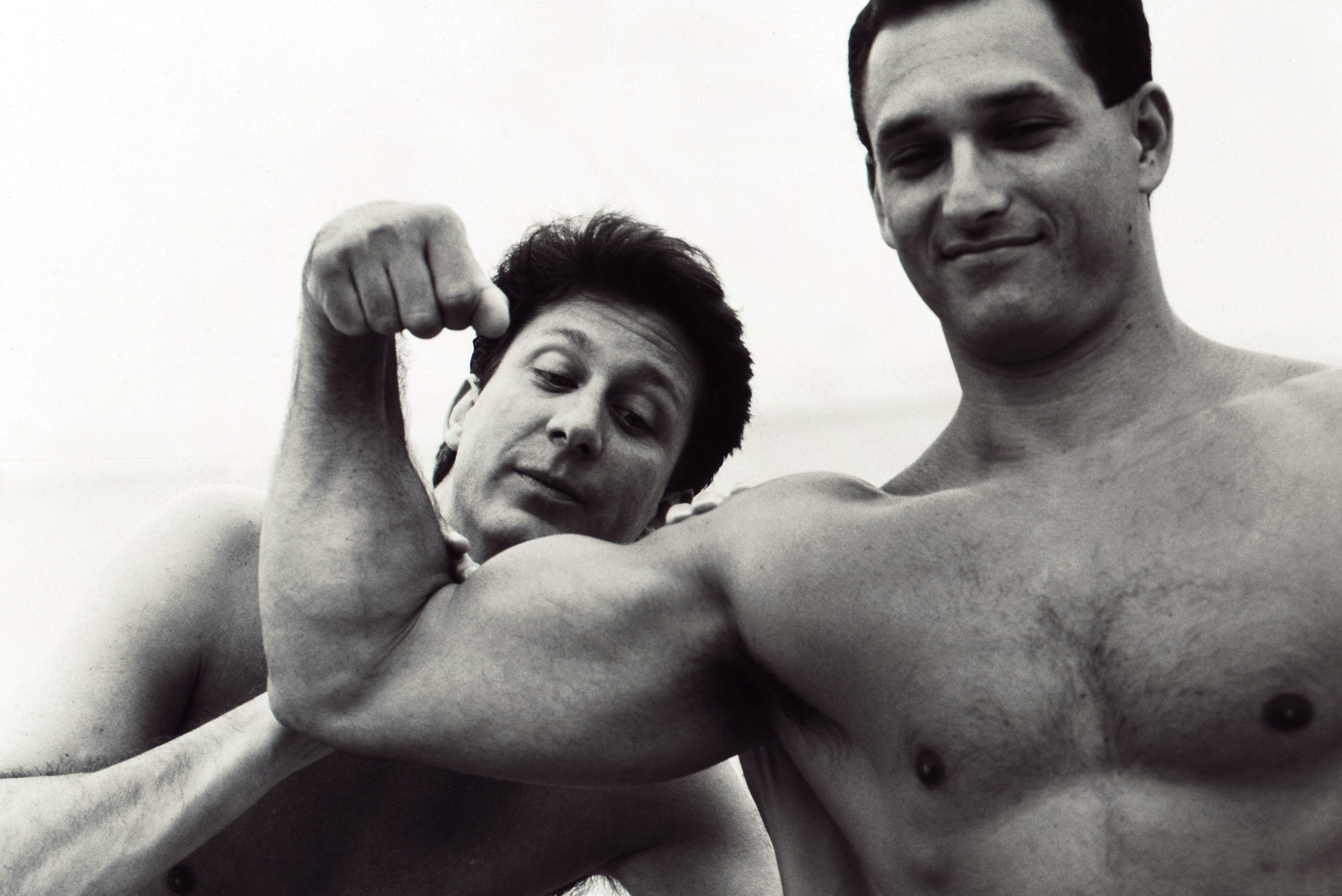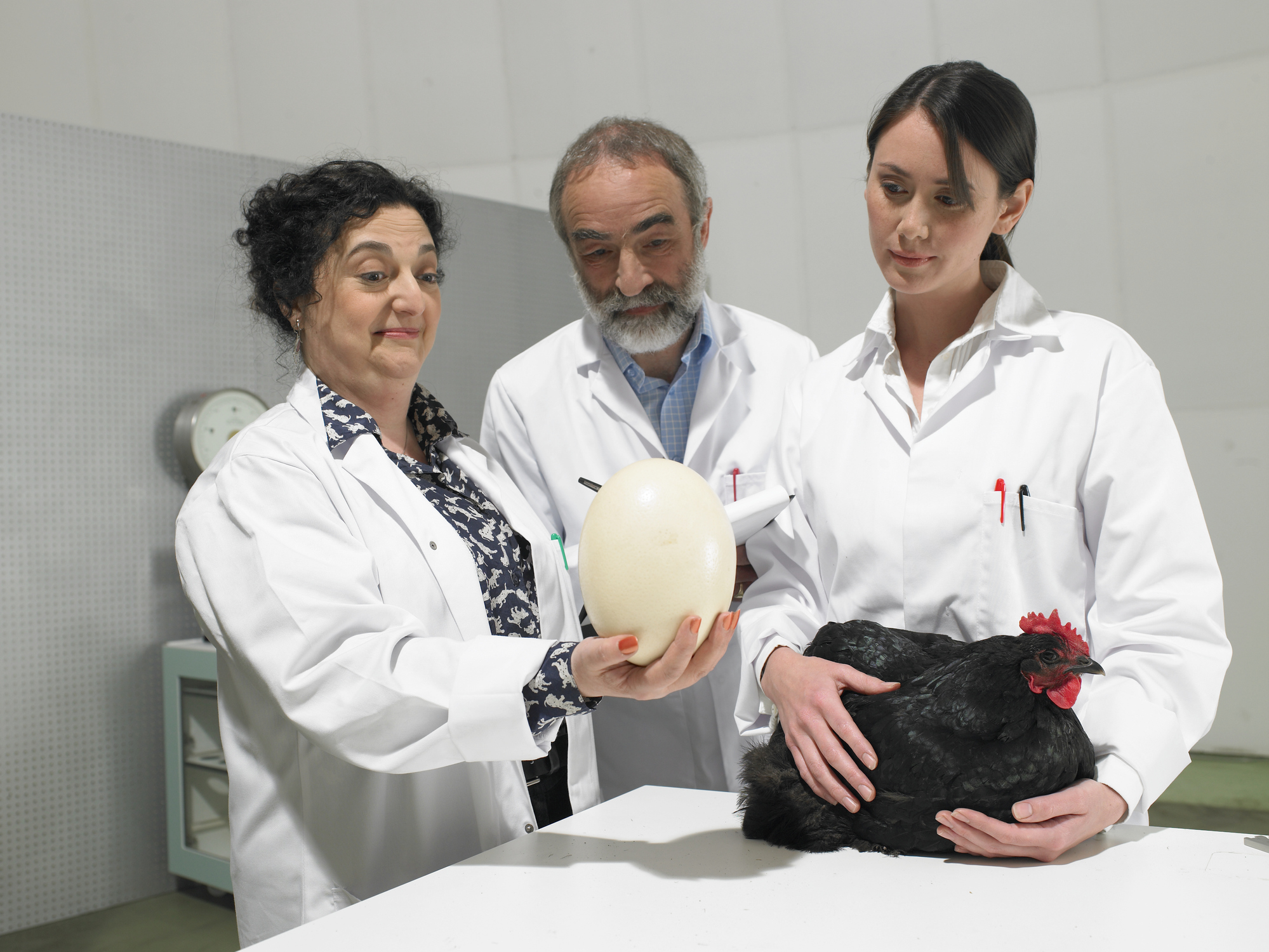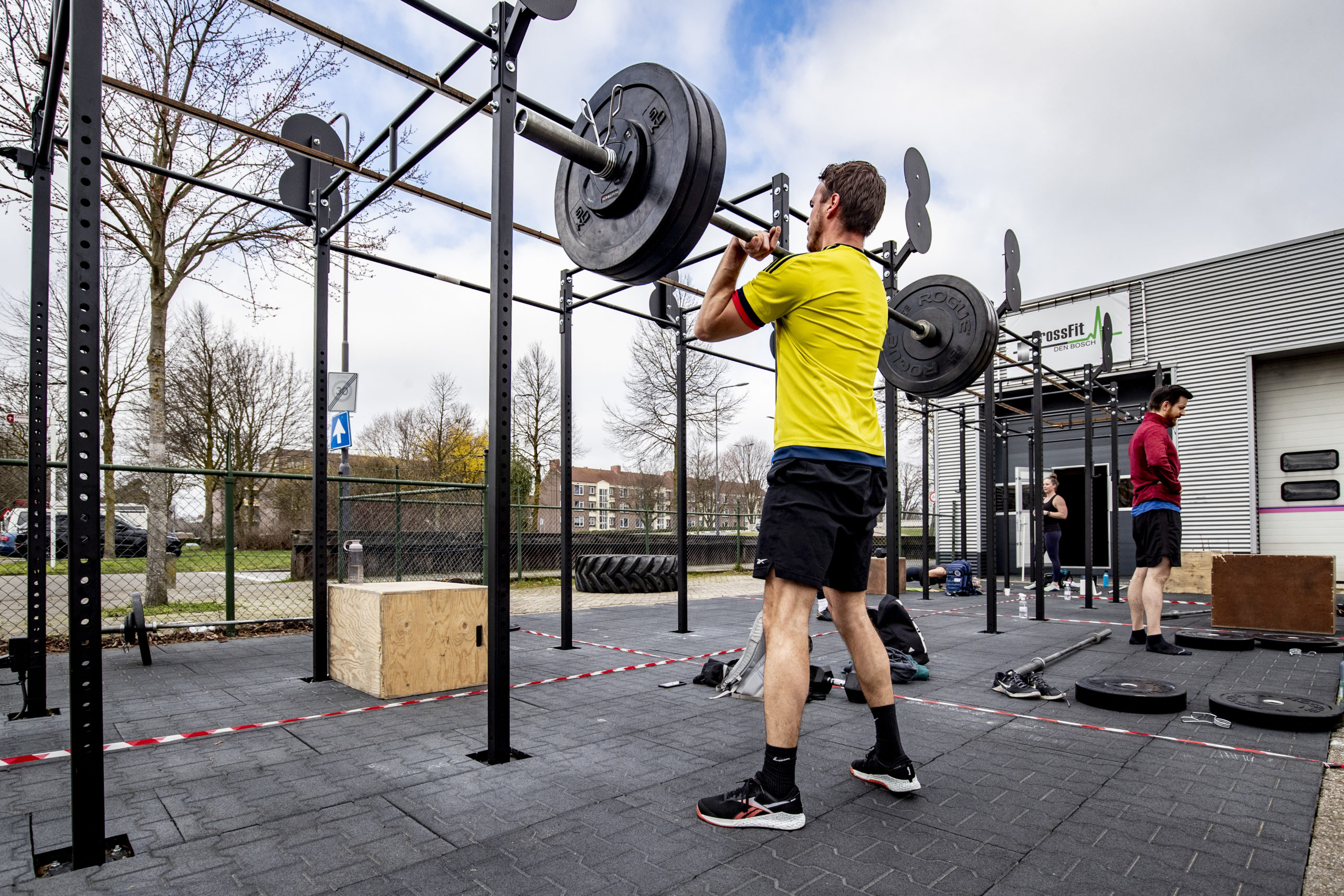How radical relativism leads to ideological fanaticism.
Do You Even Read, Bro?

In a degenerate society, physical culture is revolutionary.
“When little boys in the street laugh at the fatness of some distinguished journalist,” wrote G.K. Chesterton, “they are unconsciously assuming a standard of Greek sculpture. They are appealing to the marble Apollo.” In the same way, when today’s Right-Wing Body Builders (RWBBs for short) laugh at the fatness of some less-than-distinguished Twitterer, they too are appealing to the marble Apollo—although in a far more conscious manner than any little boy in the street.
By laying out his anti-Apollonian credentials in advance—“I am a bald, 44-year-old English professor. I am 6’1” and about 205 pounds”—Adam Ellwanger, in a recent piece for American Mind, moved to pre-empt the RWBB’s instinctual embodied response to criticism. After all, if you’re happy to admit you’re overweight, don’t lift—and don’t care—what harm can the taunt of “Do you even lift bro?” or “Post fizeek!” really do?
Sticks and stones!
Truth is, the RWBB movement was never primarily intended for the Adam Ellwangers of the world, and his various misunderstandings and misinterpretations of us only make that fact clearer. But it’s not, as he thinks, simply because he’s a doughy 44-year-old English professor. Rather, it’s because, being a doughy 44-year-old English professor, he almost inevitably holds a particular set of views, and they are not the views of a RWBB. His watchwords throughout “I Don’t Even Lift, Bro”—“moderation” (good) and “excess” (bad)—tell you all you need to know about his views, and those of so many others like him who have sought to denounce us. These are people who see no need for a great correction to the way things are today, however much they may deride “modern ideals” and “liberalism,” and gesture toward the ancients and Classical thought. These people are soft, stodgy, and so are their ideas.
Contrary to what Ellwanger says, RWBBs do have a detailed political program—in fact, multiple political programs. We aren’t just trying to get young men to get jacked, though this serves important purposes in itself—to expose the ugliness of the current state of the world and its defenders, and to attract people to our cause—as well as being for the benefit of their health and development. Getting jacked is a starting point, not an end. Far from it.
So we could say, to use Max Weber’s famous term, that being out of shape has certain “elective affinities” in the realm of ideas. The important thing about these affinities is that they are not deterministic: they are tendencies. Plenty of massively muscular men hold utterly cringeworthy beliefs, not least of all Arnold Schwarzenegger himself, whose transformation from hero to zero was made complete during the pandemic with his “screw your freedom” remarks in response to lockdown critics.
The converse is also true. One of the few men Bronze Age Pervert singles out as the embodiment of his eponymous Bronze Age Mindset is Bob Denard, a French soldier of fortune who in his later years was portly, to put it mildly. That added heft, however, did nothing to reduce his thirst for adventure and conquest, which continued more or less until his unfortunate death from Alzheimer’s. One journalist called him “a warrior king out of Homer.” I’ve also championed Oliver Reed, a man of extraordinary energy and charisma throughout his life, despite his expanding waistband. Reed famously dropped dead at the age of 61, arm wrestling a group of Royal Navy sailors in a dive bar in Valletta, Malta during the filming of Gladiator. Needless to say, he was enormously hammered at the time.
The RWBB movement, which owes its origin to Bronze Age Pervert and his self-published 2018 book Bronze Age Mindset, is not supposed to be “moderate.” The movement is a powerful counterreaction to the deeply sick world we inhabit. This “iron prison,” as BAP calls it, is a world in which men of talent and vitality feel trapped, unable to exercise and develop their inborn nature, forced into stifling jobs by a society that despises and demonizes them for wanting anything else. The same is also true for women, in their own way. Bronze Age Mindset is a promise of a return to a world of adventure and beauty, and this is precisely why it has proven so popular, far beyond the dreams of most “serious and respectable” Conservative Inc. writers and commentators, with their book deals, and also far beyond the dreams of most “serious and respectable” classicists, ancient historians, and philosophers—again, with their book deals. The “academic” perspective is precisely what’s at issue here. It too has built the walls of the iron prison.
If Ellwanger’s entire piece is built on false premises—not least of all the idea that he has no place in the movement just because he’s bald and overweight—it nevertheless allows me a good opportunity to make a number of points about what RWBBs are and are trying to do, not only with regard to physical development but also our broader goals.
Ellwanger begins his piece, at least, as someone who is sympathetic to one of the fundamental emotional stances that drives the RWBB revolt against the modern world. The Left, and the world it has helped create, is ugly. We revolt, first and foremost, because we are revolted. This ugliness is visible everywhere you care to look. I would point to one important manifestation that Ellwanger doesn’t mention: the physiognomy of the average “committed” leftist. Search “Portland Antifa mugshots 2020” and you’ll see a gallery of malformed creatures who wear their titanic resentment, their doomed rebellion against nature, on every feature of their faces. It’s not just the eyes that are windows to the soul.
A recognition of the soul-sapping ugliness of the modern world, including its ideals, is where the sympathy begins and ends, though. The gravamen, for Ellwanger, is that the RWBB response to this existential hideousness only reinforces the values it claims to reject. The RWBB, whether he knows it or not, is merely holding up a mirror—albeit one of those shape-distorting fairground mirrors—to the adipose ideal of today, revealing an equally undesirable—“excessive”—physical counter-ideal. Neither is healthy or worth the effort to obtain, Ellwanger says. He groups his criticisms of RWBBs into three categories: utilitarian; aesthetic; and political.
The utilitarian and aesthetic criticisms are largely of a piece, because they turn on the notions of “excess” and “dysfunction.” Why would I need to bench press 350 pounds? It won’t make my life as a 44-year-old English professor better in any way a 44-year-old English professor who has little knowledge of an active physical life might understand, or indeed want. At most, in my daily life I might have to walk up a couple of flights of stairs at the university library, or carry my shopping in from the car. And why would I want to invest the time—an excessive amount of time—into achieving a 350 pound bench press, when I could pursue some more moderate course of exercise that sits nicely in the middle between the extremes of total inactivity and spending all your spare time at the local Planet Fitness? Are such physiques even achievable without modern machinery, nutrition, training machines, and dangerous performance-enhancing drugs? No Bronze Age warrior had access to a Smith machine or SARMs!
The idea that attaining a muscular physique requires “a near-monomaniacal appetite for exercise” is just wrong, though whether you accept this turns on your definition of “monomaniacal.” If you’ve ever watched an episode of My 600-lb Life, you’ll know that, once you reach a certain stage of physical decay, even getting out of bed and going to the toilet is akin to one of the less appetizing mythical labors of Hercules.
Let’s assume you’re awake for 16 hours a day. That’s 112 hours a week. You follow a five-day push-pull-legs split (a common and effective weightlifting routine), spending up to 90 minutes a day, five days a week, in the gym. That’s seven-and-a-half hours a week, max. Maybe you also decide to run or walk for half an hour a day too (good idea): that’s another three-and-a-half hours a week. In total, then, you’ll be spending 11 hours a week, or 10 percent of the time you’re awake, performing physical exercise of some kind. The average American spends over 30 hours a week watching television. And yet, according to Ellwanger, the young man who exercises in pursuit of a muscular body is just as “excessive” as the couch potato. Yes, it might take you two years to build the fundaments of a great physique, but the average person just spent that amount of time—the pandemic, I mean—binge-watching Netflix and living off Door Dash. Time flies.
While it’s obviously true that some of the male models, celebrities, and athletes that BAP posts on “Handsome Thursday” are likely to be taking performance-enhancers of one sort or another—though it’s impossible to tell for sure, without proper testing, and you’d be surprised how many people with mediocre physiques are on gear—there’s no question that you can achieve an impressively muscular physique naturally, with very little modern equipment or supplementation. Testosterone propionate, the original anabolic steroid, was first synthesised in 1939, so any bodybuilders and strongmen from before that time can be considered cast-iron “natties.” Most bodybuilders and strongmen until the 1960s, when bodybuilding really started to take off, probably were too. That means John Grimek, Steve Reeves, Jack Lalanne—a whole cast of these early musclemen—would still look fantastic today in their swimshorts at the beach, and they’d be strong as hell too.
We also have no reason to believe that ancient men had physiques, or could have physiques, that were any less impressive than a Grimek or Reeves. We know that the ancient Greeks lifted weights, including dumbbell-shaped stone halteres, and performed many exercises that we would recognize today. The famous Thera stone, weighing 480 kilograms, was apparently “lifted off the floor,” according to its inscription, by Eumastas, son of Kritobolos, in the sixth century BC—a form of deadlift that would challenge even the strongest men alive today. The Greeks are known to have held proto-bodybuilding contests where aesthetics—muscular shape, size, and proportion—were the key judging criteria. The Greeks distinguished between what today we might call “yoked” physiques, with massive development of the neck, trapezius muscles and shoulders, which were fitting for slaves and those involved in habitual heavy-lifting, and the more refined and proportionate body of the well-trained freeman. The Farnese Hercules, or the beautiful Riace Bronzes, were not imagined ideals, but reflections of achievable physical perfection that their sculptors saw all around them.
So you don’t need recognizably modern equipment to get a physique that would shame most gym-goers today. In fact, you don’t even need any equipment at all. One of my favourite images is a photograph of three male Tiwi natives of Bathurst Island, off the coast of northern Australia, taken in 1939 (search for “Bathurst Island men” and you’ll find it). All three men, including a man who looks to be in his sixties, have tremendously powerful bodies, the fruits of a life of hard hunting, foraging, and eating wild game, birds, and seafood. Whatever we might want to say about the Liver King, Brian Johnson, he is right about one thing: ancestral lifestyles made for strong people.
If I’ve established that the commitment to build a better, healthier body doesn’t require a “monomaniacal appetite” for exercise, there’s still the question of the benefits of doing so. It’s not a surprise that somebody who has never been in good shape, and in all likelihood never been relied upon for his physical prowess, would raise the objection that “others reap no benefit from someone else’s great strength,” and that strength and a great physique are therefore just “token defiance” in today’s world of fat positivity and robotic bottle openers.
I could go ahead and list the various well-attested scientific benefits of gaining muscle and losing excess fat, which, as we’re coming to understand more and more, are as much mental as physical. I could talk about the moral benefits—a first taste of self-mastery, the ability to conceptualize and then actualize beneficial change over a medium-to-long-term time frame, etc.—as well as the potential social and sexual benefits. But doing so would be otiose, because what Ellwanger is really getting at with his critique is that RWBBs have no program beyond lifting weights for a better body. Being a RWBB has no “political” benefits is the point he really wants to hammer home. The personal is not political.
In an immediate sense, I think it should be clear why conservatives and right-wingers might want to cultivate a different aesthetic. For decades, mainstream conservatism has had a terrible image problem that has hobbled it and drastically reduced its appeal. In my native UK for example, the average conservative male is a gelatinous middle-aged man in pink or red chinos, an ill-fitting tweed jacket and poorly matching shoes. This is the model held out for all young conservative men. While many will quickly and enthusiastically become wheezing bright-trousered clones themselves, many others, just like myself, will be and are totally turned off.
As the Left finally floats away into the clouds, having severed its last moorings to the natural world, the Right has an opportunity to stake its claim to everything of worth left behind on terra firma—and that includes, obviously, human beauty and physical excellence. Don’t get me wrong. I’m not suggesting that being a RWBB is some kind of new youth-outreach scheme for the Right. I’m suggesting RWBBs might finally make the Right something its critics love to claim it is, but which in reality it really isn’t: dangerous. And dangerous means sexy. Perhaps we might really start winning, for a change.
At no point have any of the leaders of the RWBB movement, whether we’re talking about BAP, me, or anybody else, argued that you must be content just to have a beautiful physique and spend time looking at it. The image, as I’ve just said, has a value in and of itself for certain political purposes, but that’s only the start.
Still, because Ellwanger believes a ripped physique is all RWBBs want, he can confidently dismiss the movement as narcissistic “self-care,” another form of the “idolatrous…self-worship” that is liberalism’s core value and sole model for life. “Ultimately the pursuit of a muscle-bound physique partakes of the same values that animate liberal secular modernity,” he warns us. Given how obviously misplaced this criticism is, I wonder whether Ellwanger has read Bronze Age Mindset, or my books, or indeed anything else written by a RWBB.
Bronze Age Mindset is an explicitly political book. It places the cultivation of true male friendship at the center of a return to politics as practiced in the Bronze Age. Male friendship is mercilessly attacked by the liberal regime—just look at the reaction to the recent Tucker documentary, the End of Men—because it represents a clear threat to the entire edifice of our consumerist clown world order. In the Bronze Age, groups of determined men, bound by ties of friendship and a shared vision, like the Sacred Bands of Thebes, were able to overturn the existing political system and establish a new one in its place. Indeed, male friendship has had this revolutionary potential throughout most of Western history. BAP hopes that, as the current global system collapses under the weight of its own contradictions, conditions might be right for such groups to return to prominence. Hence the lionizing of Bob Denard.
There’s much more to Bronze Age Mindset than just this, more than I could summarize here. It’s worth noting that the book has all sorts of varied political implications, including many that would not just shock but also surprise the average conservative. BAP rose the alarm regarding the terrible effects of widespread environmental contamination by estrogenic substances, also known as xenoestrogens, for instance. Many of the RWBBs’ strictures about diet and lifestyle are aimed precisely at reducing one’s exposure to these ubiquitous chemicals and mitigating their effects on natural hormonal balance. This is not an issue confined to the personal level, but one with the gravest implications for society, indeed the species. The problem is now so bad that, if current trends are extrapolated, humans may not be able to reproduce naturally by 2045. I didn’t just make that up: that’s the opinion of world expert Shanna Swan, a professor at Mount Sinai who has dedicated her career to studying trends in fertility. Tucker Carlson made this fertility crisis the central issue of The End of Men, which featured interviews with a selection of RWBBs, including me, who are all trying to do what we can to raise awareness and educate people how to protect themselves, their families, and their communities.
In my own work, especially with my latest book, The Eggs Benedict Option, I’ve tried to articulate a vision of a new populist nationalism built around reclaiming our health and independence from the corporations that control so much of the food supply. Here the RWBB insistence on individual physical fitness, based not just in exercise but also in consuming the nutritious foods that made our ancestors strong, becomes a rallying point against the Great Reset and the plan for a global “plant-based future” that will turn every aspect of our lives upside down. Just like the great Agricultural Revolution of the Neolithic, which was a far less positive and far less consensual transformation than our blithe notion of progress tells us, the Great Reset is a total social transformation that is built on totally new methods of food production and consumption. For what it’s worth, The Eggs Benedict Option has been an Amazon #1 bestseller since its release last summer, and has consistently outsold paeans to the Great Reset like George Monbiot’s new book Regenesis, which was released at the same time.
So if this is liberal “self-care” or “idolatrous self-worship,” I’m Adam Ellwanger—with the schoolgirl bench press to prove it.
The American Mind presents a range of perspectives. Views are writers’ own and do not necessarily represent those of The Claremont Institute.
The American Mind is a publication of the Claremont Institute, a non-profit 501(c)(3) organization, dedicated to restoring the principles of the American Founding to their rightful, preeminent authority in our national life. Interested in supporting our work? Gifts to the Claremont Institute are tax-deductible.
A new plant-based “egg” represents the advent of the transhumanist global state.
America faces a grim future as marriage rates plummet.
Turning basic facts into thought crimes turns normal people into thought criminals.
There is simply no room in a free country for a ruler with Fauci’s unaccountable power.
Our useless ruling classes are making a hard decision way, way worse.






